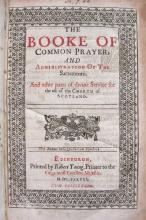The booke of common prayer (Edinburgh: Robert Young, 1637).
The title page of Archbishop Laud's edition of the Book of common prayer, the introduction of which into the Scottish church started a chain of events which helped precipitate the Civil Wars of the 17th century. The Book of common prayer, first published in 1549, was instigated by Thomas Cranmer, Archbishop of Canterbury, as a reformation and simplification of the Latin services used by the medieval church, and has been the official order of service for the Church of England since 1559. By 1637 it had been revised several times as the religious establishment struggled to find a formula that satisfied the various religious factions. William Laud (1573-1645), Archbishop of Canterbury during the reign of Charles I, attempted to impose liturgical uniformity by force. His revision of the Book of common prayer for the Scottish church was part of this drive. It was bitterly resented by the Presbyterian congregation, led to rioting in the Kirk of St Giles, and in 1638 the National Covenant was signed in reply. It was, amongst other matters, the King's need for resources to confront the rebellion of the Covenanters successfully that forced him to recall Parliament for the first time in eleven years, but once called Parliament refused to consider his requests for money until their grievances were heard. It was Charles's mishandling of Parliament from this point on that ensured the outbreak of war. Laud was eventually beheaded by the Parliamentarians in 1645.
Bequest of Thomas Baker.
